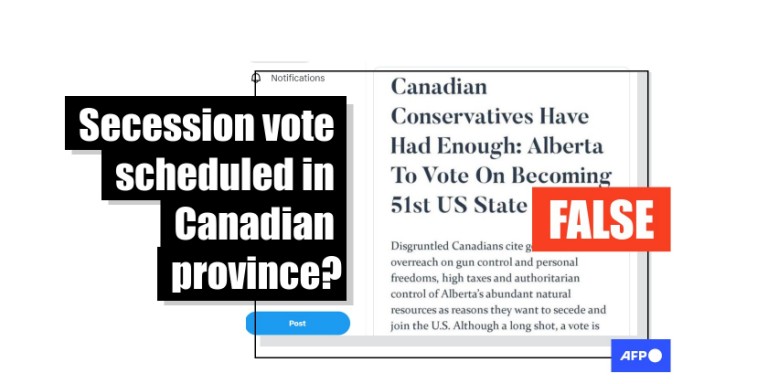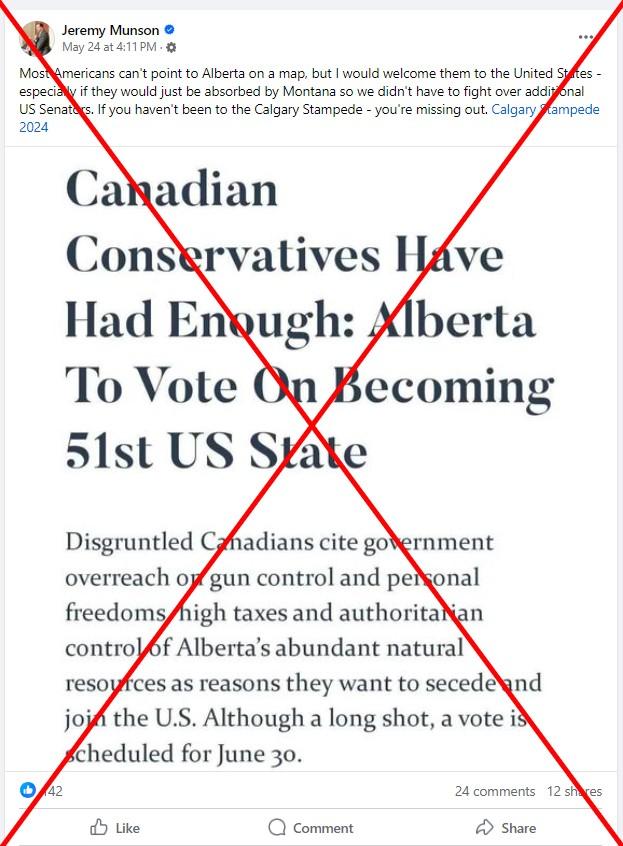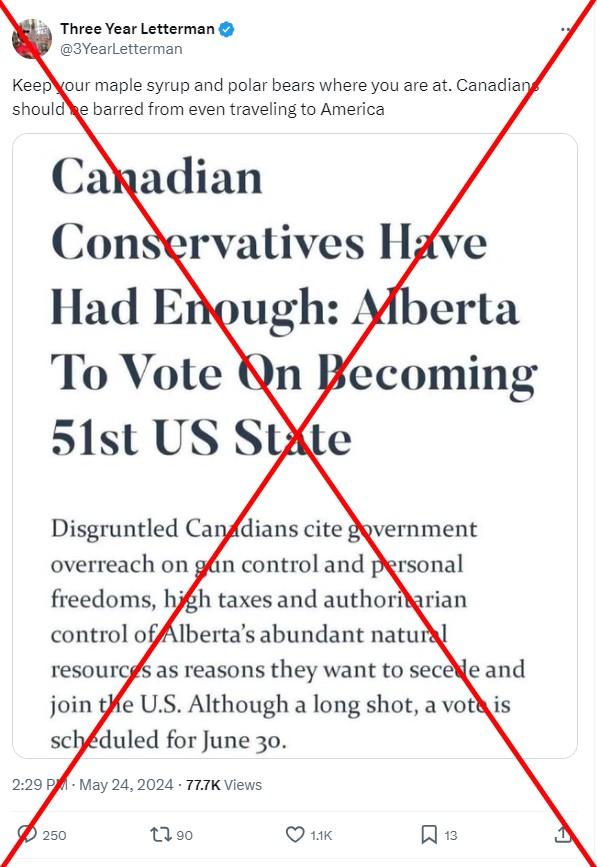
Alberta not voting on whether to seek US statehood
- This article is more than one year old.
- Published on June 5, 2024 at 21:58
- 3 min read
- By Gwen Roley, AFP Canada
"Canadian Conservatives Have Had Enough: Alberta To Vote On Becoming 51st US State," reads the text in screenshot shared on Facebook by former Minnesota State Representative Jeremy Munson on May 24, 2024.
The same image spread across Facebook, Threads and X, with additional text claiming a June 30 vote would decide whether the Canadian province would secede and join the United States.


However, Elections Alberta told AFP in a June 3 email that no such vote was scheduled to take place. Searching Elections Alberta's website also shows there are no votes programmed for the end of the month (archived here).
A reverse-image search of the screenshot reveals the text comes from a June 10, 2023 article from the Cowboy State Daily. The outlet says it serves readers in Wyoming, but it was found by Columbia Journalism Review to have spread misinformation (archived here).
The article claimed Albertans were circulating a petition to push secession and statehood on to a June 30 ballot. There were no votes which took place in the province on June 30, 2023 (archived here).
Cowboy State Daily told AFP in a June 5, 2024 email that the reporter who wrote the article was no longer with outlet and said the story had been updated to clarify it was referencing a Change.org petition (archived here).
Robyn Bell, a spokeswoman with Elections Alberta, said citizen initiative petitions which can introduce legislative or policy proposals are posted on the agency's website. AFP was not able to find any petition mentioning Alberta statehood on the page (archived here) or in archived versions.
Alberta separatist support
The story from Cowboy State Daily was published around the same time as a flurry of attention surrounded a project called "Alberta 51," which advocates that the province be added as a US state.
Jared Wesley, a professor of political science at the University of Alberta (archived here), said that despite the elevated coverage during summer 2023, separatist movements in the province have historically been disorganized and on the margins of political discussions.
"We don't even know if you could consider it to be a fully fleshed out movement," Wesley said.
He said support for separatism has existed in the province since at least the 1980s and this enthusiasm peaked with 29 percent of Albertans supporting independence after the Liberal victory in 2019 federal elections, according to polling he presented to the Public Order Emergency Commission (archived here).
"It was more bravado and frustration than it was actual separatist sentiment. It was about sending the rest of Canada a message that Alberta wasn't happy," he said.
In 2022, total support for separatism had dropped to 19 percent, with only nine percent saying they thought separation was likely to happen.
Despite low public appetite to attempt secession, Wesley said separatism and independence continue to influence politics in the province. The United Conservatives' 2022 Sovereignty Act (archived here) granted the province power to challenge requirements from Ottawa and was reportedly influenced by the Free Alberta Strategy proposal paper (archived here), which presents independence as a last resort.
51st state initiatives
A successful petition calling for separatism would not be required to trigger a vote as Alberta's Referendum Act gives the provincial government power to call for a ballot to decide an issue (archived here).
Canada's French-speaking Quebec province held two failed independence referendums in 1980 and 1995 (archived here and here).
Wesley said the votes established a road map for how a province could hypothetically leave Canada -- requiring a clear question about separation and a clear majority voting to separate. But he said the Quebec referendums did not offer insights into how a Canadian province could eventually become a US state.
"To be blunt, they haven't thought that far ahead," he said.
The US Constitution gives Congress authority to admit new states (archived here). According to the National Constitution Center (archived here), the process to become a state varies, but typically a jurisdiction would have to be incorporated as a territory before creating a local constitution and holding a vote to establish citizen support for statehood.
The US territory of Puerto Rico and the District of Columbia have both passed referendums supporting statehood for their jurisdictions (archived here and here), but Congress has yet to pass a vote on their admittance (archived here).
Read more of AFP's reporting on misinformation in Canada here.
Copyright © AFP 2017-2026. Any commercial use of this content requires a subscription. Click here to find out more.
Is there content that you would like AFP to fact-check? Get in touch.
Contact us
